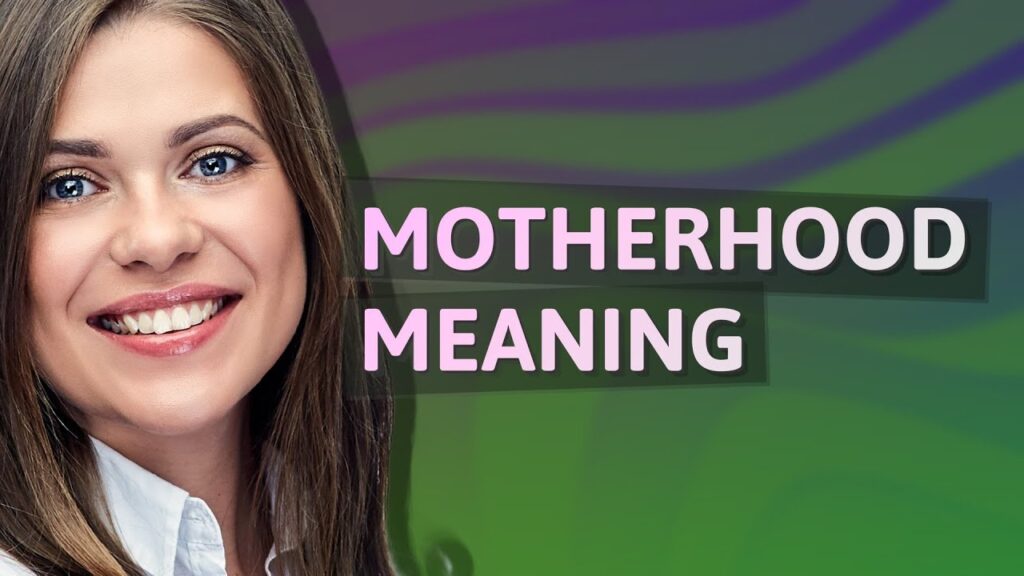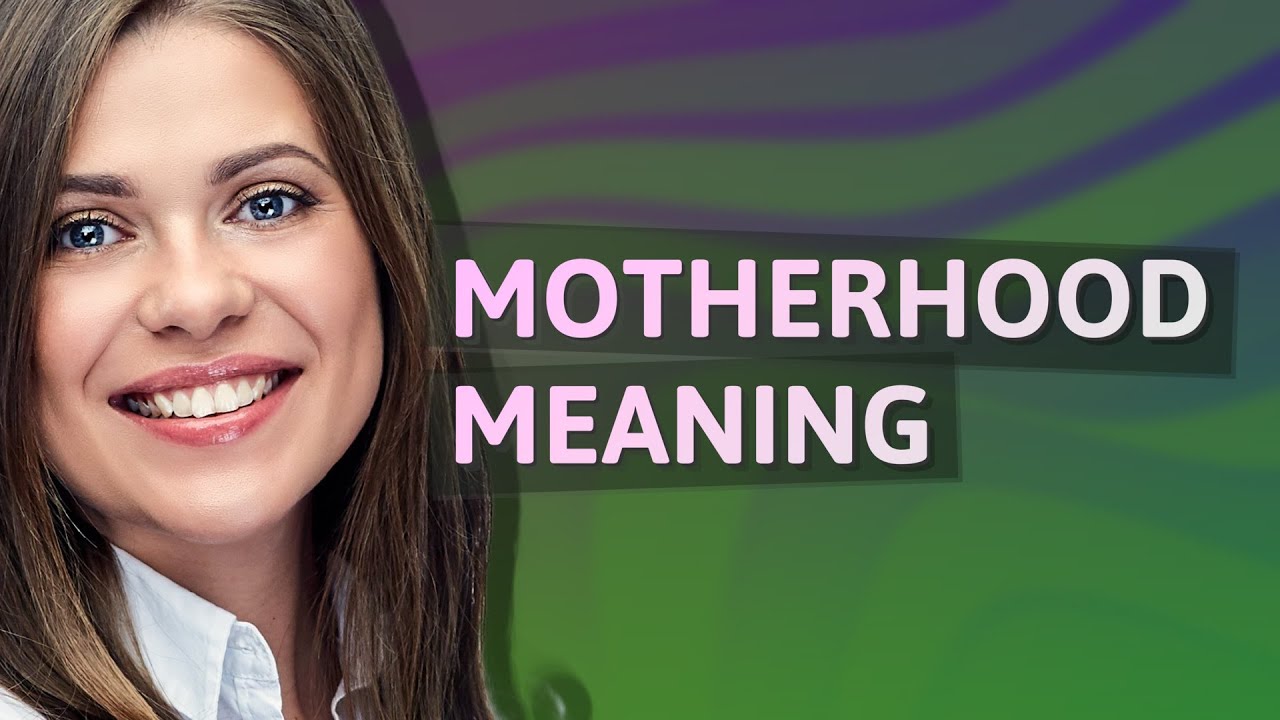
What is the Meaning of Motherhood? Exploring Its Depth and Significance
The question, what is the meaning of motherhood, is one that resonates deeply across cultures and generations. It’s a query that delves far beyond the simple biological definition, encompassing emotional, social, and psychological dimensions. Motherhood is more than just bearing a child; it’s a transformative journey filled with profound love, sacrifice, and unwavering commitment. This article aims to explore the multifaceted meaning of motherhood, examining its joys, challenges, and enduring impact on individuals and society.
The Biological and Evolutionary Roots of Motherhood
Biologically, motherhood centers around the process of gestation, childbirth, and the initial nurturing of offspring. From an evolutionary perspective, motherhood ensures the survival and propagation of the species. This inherent drive to protect and care for one’s young is deeply ingrained in many species, including humans. The hormonal changes during pregnancy and after childbirth, such as the release of oxytocin (often called the “love hormone”), foster a strong bond between mother and child.
However, the biological aspect is just the starting point. Modern motherhood extends far beyond these fundamental instincts. It involves conscious decisions, careful planning, and a continuous adaptation to the evolving needs of the child.
The Emotional Landscape of Motherhood
The emotional aspect of motherhood is perhaps its most profound. The bond between a mother and child begins to form even before birth. The anticipation, the hopes, and the dreams for the child create a powerful emotional connection. After birth, this connection deepens through physical contact, nurturing care, and unwavering love. The sheer joy of witnessing a child’s first smile, first steps, and first words are experiences unique to the journey of motherhood.
However, the emotional landscape isn’t always idyllic. Motherhood can also bring about feelings of anxiety, exhaustion, and even guilt. The pressure to be a “perfect” mother, combined with the demands of childcare and often career responsibilities, can be overwhelming. Postpartum depression is a significant concern, affecting many new mothers and highlighting the emotional challenges inherent in motherhood.
The Social and Cultural Dimensions of Motherhood
The meaning of motherhood is also shaped by social and cultural contexts. Societal expectations, cultural norms, and family traditions all influence how motherhood is perceived and practiced. In some cultures, motherhood is seen as the ultimate fulfillment for a woman, while in others, women are encouraged to balance motherhood with other pursuits, such as career and personal development.
The role of a mother also varies across different socioeconomic backgrounds. Mothers in disadvantaged communities may face additional challenges, such as limited access to healthcare, education, and financial resources. These factors can significantly impact their ability to provide for their children and navigate the complexities of motherhood. [See also: Supporting Single Mothers]
The Psychological Impact of Motherhood
Psychologically, motherhood can be a transformative experience. It often leads to a shift in priorities, values, and self-identity. Many women find that motherhood unlocks a previously untapped reservoir of strength, resilience, and compassion. The constant need to care for and protect a child can foster a deep sense of purpose and responsibility.
However, motherhood can also trigger feelings of vulnerability and self-doubt. The fear of making mistakes, the constant worry about the child’s well-being, and the sacrifices involved in motherhood can take a toll on a woman’s mental health. It’s crucial for mothers to prioritize self-care and seek support when needed to navigate these psychological challenges.
The Challenges and Sacrifices of Motherhood
Motherhood is not without its challenges and sacrifices. Mothers often put their own needs and desires aside to prioritize the well-being of their children. This can involve giving up career opportunities, social activities, and personal time. The financial burden of raising a child can also be significant, requiring careful budgeting and financial planning.
Furthermore, the demands of childcare can be physically and emotionally exhausting. Sleep deprivation, constant attention to the child’s needs, and the never-ending cycle of feeding, cleaning, and nurturing can be overwhelming. It’s essential for mothers to have a strong support system, including family, friends, and community resources, to help them navigate these challenges. Understanding what is the meaning of motherhood helps to prepare for these realities.
The Joys and Rewards of Motherhood
Despite the challenges, motherhood is also filled with immeasurable joys and rewards. Witnessing a child’s growth and development, sharing in their accomplishments, and experiencing their unconditional love are among the most fulfilling aspects of motherhood. The bond between a mother and child is often unbreakable, providing a source of comfort, support, and companionship throughout life.
The impact of a mother’s love and guidance can extend far beyond the immediate family. Mothers play a crucial role in shaping the next generation, instilling values, and fostering positive social change. By nurturing their children, mothers contribute to the well-being of society as a whole. This is a key element in understanding what is the meaning of motherhood.
The Evolving Definition of Motherhood
The definition of motherhood is constantly evolving to reflect changing social norms and family structures. Single motherhood, adoptive motherhood, and same-sex motherhood are becoming increasingly common, challenging traditional notions of what it means to be a mother. These diverse forms of motherhood highlight the universal capacity for love, care, and commitment that lies at the heart of the maternal role.
Technological advancements, such as assisted reproductive technologies, have also expanded the possibilities for motherhood, allowing women who may have been unable to conceive naturally to experience the joys of motherhood. [See also: Ethical Considerations of IVF] These advancements raise important ethical and social questions about the definition of family and the role of technology in reproduction.
The Importance of Support for Mothers
Given the challenges and sacrifices involved in motherhood, it’s crucial to provide adequate support for mothers. This support can take many forms, including financial assistance, access to healthcare, childcare services, and emotional support. Employers can also play a role by offering flexible work arrangements and parental leave policies that allow mothers to balance their work and family responsibilities.
Creating a supportive environment for mothers not only benefits individual families but also strengthens society as a whole. When mothers are supported, they are better able to care for their children, contribute to the economy, and participate in civic life. Understanding what is the meaning of motherhood also involves recognizing the need to support and empower mothers in all aspects of their lives.
Conclusion: Embracing the Multifaceted Meaning of Motherhood
In conclusion, what is the meaning of motherhood is a complex and multifaceted question that has no single answer. Motherhood encompasses biological, emotional, social, and psychological dimensions, all of which contribute to its profound significance. While motherhood can be challenging and demanding, it is also filled with immeasurable joys and rewards. By embracing the diverse forms of motherhood and providing adequate support for mothers, we can create a more equitable and compassionate society for all. The ongoing exploration of what is the meaning of motherhood enriches our understanding of human connection and the vital role mothers play in shaping the future.

